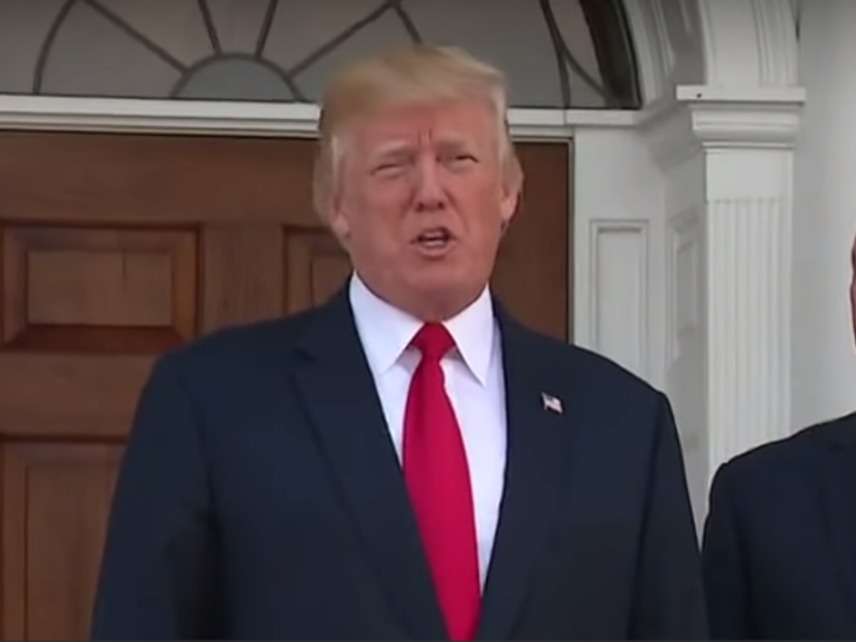Trump Wants 'Comprehensive Background Checks' for Gun Buyers. What Does That Mean?
A screening system can be "comprehensive" without being smart, fair, or effective.

Today on Twitter, Donald Trump announced that he "will be strongly pushing Comprehensive Background Checks with an emphasis on Mental Health." I'm not sure what he means by that, and I'm not sure he knows what he means by that. But it is worth considering a few possible interpretations and whether they make sense as a response to last week's mass shooting at a high school in Florida.
By "comprehensive background checks," Trump might mean "universal background checks," a policy advocated by his predecessor that would require FBI clearance for every gun transfer and not just for those involving federally licensed dealers, as under current law. The perpetrator of the Florida attack, like most mass shooters, did not have a criminal or psychiatric record that would have legally disqualified him from owning a gun, and he passed a background check when he bought the rifle he used to kill 17 people at Marjory Stoneman Douglas High School. Requiring background checks for private transactions clearly would not thwart mass shooters who do not meet the criteria for blocking a sale, which is typically the case.
Trump might be talking about expanding those criteria. A gun violence restraining order (GVRO), for example, prohibits people from purchasing or possessing firearms when a judge decides they probably pose a significant danger to themselves or others. A GVRO can be sought by police officers or by certain people who know the target, a category that is quite broad in California and even broader in Washington. It probably would have to be broader still for a GVRO law to have made a difference in Florida. New York takes a different approach, requiring mental health professionals to report anyone they deem "likely to engage in conduct that will cause serious harm to self or others." The subjects of such reports can expect to lose any guns they own, along with the right to purchase them in the future.
While laws like these could conceivably prevent a mass shooting, the standards of evidence they use and the incentives they create mean that the vast majority of people whose Second Amendment rights they revoke will be innocent and harmless. But that is par for the course under current federal law, which bans gun ownership by broad classes of people based on criteria that have little or nothing to do with their propensity for violence. Anyone convicted of a felony, violent or not, loses the constitutional right to armed self-defense. So does anyone who illegally uses a controlled substance, including millions of cannabis consumers, even if they live in states that have legalized marijuana. So does anyone who was ever subjected to involuntary psychiatric treatment, even if he never showed any inclination to hurt other people. So does anyone who is in this country without the government's permission, including millions of peaceful and productive residents who have lived in the United States for years.
In 2004 the Justice Department's inspector general examined cases in which gun purchases were approved and it was later discovered that the buyers were not legally allowed to own firearms. The resulting report noted that there were often delays in retrieving weapons from prohibited buyers, partly because "ATF special agents did not consider most of the prohibited persons who had obtained guns to be dangerous and therefore did not consider it a priority to retrieve the firearm promptly." If disqualified buyers are not dangerous, why are they disqualified?
Because the criteria for blocking gun sales are already arbitrary, unjust, and unreasonably broad, any proposal to expand them further should be viewed with skepticism. Likewise proposals to "improve" background checks by making the databases on which they rely more comprehensive, which might be what Trump, who also talks about "strengthening Background Checks," has in mind.
If that means making sure the records of people who have committed violent crimes are included in the National Instant Criminal Background Check System (NICS), it would be a genuine improvement and might even help prevent a mass shooting. The perpretator of last year's massacre at a church in Texas, for example, was convicted by a court martial of crimes that legally disqualified him from buying guns. He passed a background check anyway, because the Air Force neglected to share his information with NICS. Legislation aimed at improving the sharing of such information could make a difference, although someone bent on violence who had a disqualifying criminal record could still find a way to obtain guns without undergoing a background check.
But if "strengthening background checks" means adding information about people who have never demonstrated any violent tendencies, it would only make an arbitrary and unjust screening system more arbitary and unjust. If the aim is to prevent would-be murderers from obtaining guns, it hardly makes sense to flag more nonviolent offenders, more medical marijuana users, or more people who years ago underwent court-ordered treatment because someone thought they might be suicidal. Background checks can be "comprehensive" without being smart, fair, or effective.
